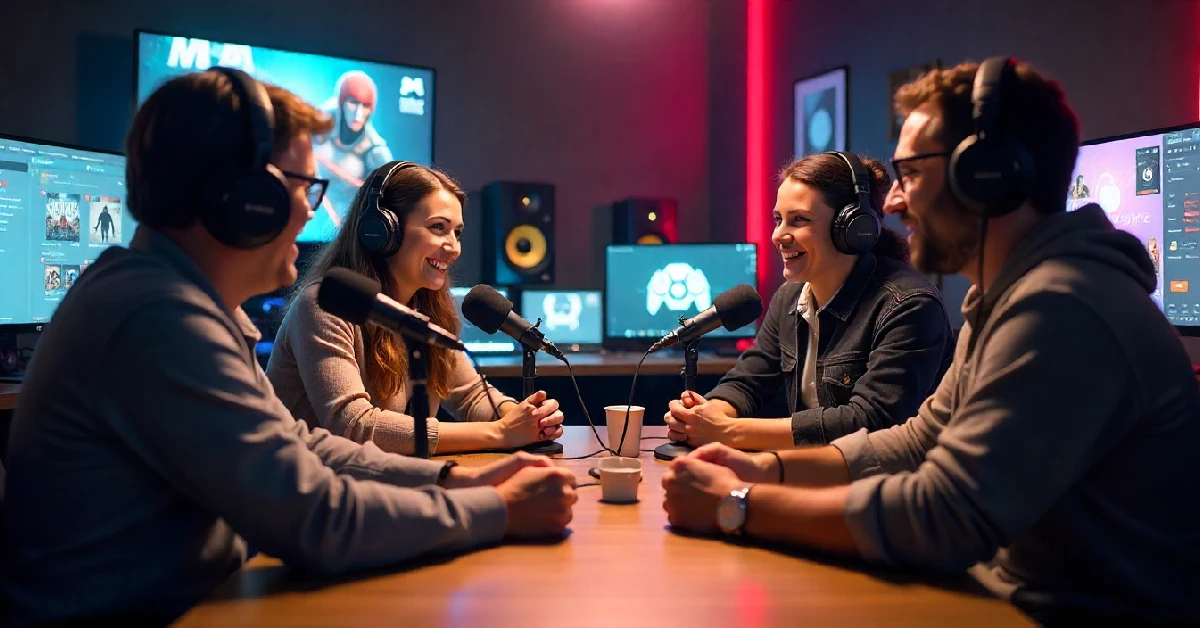Picture this: you’re scrolling through endless podcast options, looking for something that gets your geek heart racing. You want tech talk that doesn’t sound like a corporate presentation. You want gaming discussions that feel like chatting with your crew. That’s where Geekzilla Podcast steps in, delivering exactly what you’ve been searching for in the crowded world of geek culture shows.
This isn’t just another tech podcast throwing around buzzwords and sponsored content. Geekzilla Podcast brings authentic conversations about the stuff that actually matters to geeks, gamers, and tech enthusiasts. Whether you’re into comic book deep dives or the latest gaming industry drama, this show has carved out its own space in the podcasting world.
What Makes Geekzilla Podcast Stand Out
The Geekzilla Podcast doesn’t try to be everything to everyone, and that’s exactly why it works so well.
Their approach feels refreshingly honest in a space filled with overly polished productions. The hosts tackle topics ranging from cutting-edge technology reviews to nostalgic gaming retrospectives, creating content that resonates with both hardcore enthusiasts and casual fans. You won’t find generic talking points or surface-level discussions here.
What sets this show apart is how it balances entertainment with genuine insights. They’re not afraid to dive deep into controversial gaming industry topics or offer honest takes on the latest tech releases. The conversations flow naturally, making you feel like you’re hanging out with friends who happen to know their stuff.
The production quality hits that sweet spot between professional and accessible. You can actually hear what everyone’s saying without dealing with echo-heavy recordings or constant audio issues. They’ve figured out how to sound polished without losing that authentic, conversational vibe that makes podcasts worth listening to.
Meet the Voices Behind the Show
The Geekzilla Podcast hosts bring different perspectives that keep conversations dynamic and interesting without falling into predictable patterns.
Erik leads discussions with a background in technology journalism, bringing industry insights that go beyond surface-level news coverage. His experience shows when he breaks down complex tech developments into digestible explanations that don’t talk down to listeners. John adds gaming expertise with a focus on both indie darlings and AAA blockbusters.
Sarah brings entertainment media knowledge, especially around comic book culture and sci-fi franchises that dominate modern pop culture. Her takes on Marvel and DC developments often spark the most engaging discussions among listeners. Alex rounds out the team with a focus on emerging technologies and their impact on gaming.
The chemistry between hosts feels genuine rather than forced, creating an environment where disagreements lead to interesting conversations instead of awkward moments. They’re not trying to create viral moments or manufacture drama for engagement. Instead, they focus on having real discussions about topics they genuinely care about.
Topics That Keep Listeners Coming Back
Gaming discussions cover everything from indie gems you’ve never heard of to major industry shake-ups that affect everyone.
The hosts don’t just review games; they explore what makes certain titles resonate with players and why others fall flat despite massive marketing budgets. Recent episodes have covered the rise of subscription gaming services, the ongoing debate around digital versus physical game ownership, and how smaller studios are challenging established industry giants.
Technology segments go beyond basic product reviews to examine how new developments might change how we interact with digital content. They’ve tackled everything from VR adoption challenges to the practical implications of AI integration in gaming. The discussions stay grounded in real-world applications rather than getting lost in theoretical possibilities.
Comic book and entertainment coverage focuses on storytelling quality and cultural impact rather than just plot summaries. They examine how different franchises handle character development, world-building, and fan expectations. Pop culture analysis includes both current releases and retrospective looks at influential works that shaped modern geek culture.
Where to Find Geekzilla Podcast
You can access the Geekzilla Podcast through all major platforms, making it easy to fit into your existing listening routine.
Spotify users will find the complete episode library with reliable streaming and download options for offline listening during commutes or workouts. Apple Podcasts offers the same comprehensive access with seamless integration across iOS devices. Google Podcasts provides another solid option for Android users who prefer staying within Google’s ecosystem.
YouTube hosting allows for video versions of select episodes, giving you the option to watch hosts’ reactions during particularly animated discussions. Podbean serves as their primary hosting platform, offering direct access and often featuring episodes slightly earlier than other platforms. The geekzilla.io website provides additional content and community features.
The Geekzilla Radio app offers specialized features designed specifically for regular listeners, including personalized recommendations and community interaction tools. Most platforms update with new episodes weekly, though the schedule occasionally shifts based on major industry events or convention coverage.
Community and Listener Engagement
The show has built a genuine community around shared interests rather than just promoting passive consumption of content.
Listeners actively participate through social media discussions, episode feedback, and topic suggestions that actually influence future content direction. The hosts regularly acknowledge community contributions and incorporate listener questions into episodes without making it feel like a forced segment. Fan theories and recommendations often spark entire episodes.
Interactive elements include polls about controversial topics, community gaming sessions, and convention meetups that strengthen connections between listeners and hosts. The engagement feels organic rather than manufactured, creating genuine conversations around shared passions. Regular listeners often recognize each other’s usernames and build their own connections.
Community feedback directly shapes content decisions, with hosts adjusting coverage based on what resonates most with their audience. This responsive approach has helped the show maintain relevance as geek culture continues evolving. The result is a podcast that feels like it grows alongside its community.
Production Quality and Format
Episodes typically run between 45-90 minutes, giving topics enough time to develop without overstaying their welcome.
The format balances structure with flexibility, allowing for organic conversations while maintaining clear topic organization that makes episodes easy to follow. Audio quality remains consistently professional across different recording environments, whether hosts are in-studio or connecting remotely. Editing removes dead air and technical issues without overproducing conversations into unnatural soundbites.
Guest appearances happen regularly but never feel forced or purely promotional, with invited experts adding genuine value to discussions rather than just plugging projects. The hosts do their homework before interviews, asking questions that reveal interesting insights rather than repeating standard press tour talking points.
Episode pacing keeps energy levels up without rushing through important points or dwelling unnecessarily on minor details. Transitions between topics flow smoothly, maintaining listener engagement throughout longer episodes. The show has found its rhythm after experimenting with different formats during early episodes.
Why This Podcast Matters Now
The Geekzilla Podcast fills a specific gap in the current podcast landscape by treating geek culture seriously without losing accessibility.
Many shows either go too deep into technical details that alienate casual fans or stay so surface-level that enthusiasts get bored. This show strikes a balance that serves both audiences effectively. They respect their listeners’ intelligence while explaining concepts clearly enough for newcomers to follow along comfortably.
Current geek culture moves fast, with new developments in gaming, technology, and entertainment happening constantly across multiple platforms and media. Having trusted voices who can process these changes and provide thoughtful analysis saves listeners time while keeping them informed. The hosts’ diverse backgrounds ensure comprehensive coverage.
The podcast landscape has become increasingly corporate, with many shows prioritizing advertiser-friendly content over honest opinions. Geekzilla maintains independence that allows for genuine criticism and praise based on merit rather than business relationships. This authenticity resonates with audiences tired of obviously sponsored content.
Getting Started as a New Listener
Jump in with recent episodes rather than feeling pressured to start from the beginning of their catalog.
The conversational format means you won’t miss crucial context by starting with current content, and recent episodes reflect the show’s evolved style and improved production quality. Look for episodes covering topics you’re already interested in to get a feel for their approach. Gaming-focused episodes often provide good entry points.
Pay attention to how hosts handle disagreements and build on each other’s points rather than just taking turns talking. This dynamic creates the engaging conversations that keep regular listeners coming back. Episodes featuring guest experts often showcase the hosts’ interviewing skills and provide diverse perspectives.
Don’t worry about understanding every reference or inside joke immediately; the community aspect develops naturally as you become more familiar with recurring themes. The hosts do a good job of providing context for ongoing discussions without over-explaining everything for new listeners.
The Bottom Line
The Geekzilla Podcast succeeds because it respects both its subject matter and its audience intelligence.
In a crowded field of generic tech talk and surface-level entertainment coverage, this show offers genuine insights delivered through authentic conversations. The hosts have built something that serves dedicated geek culture enthusiasts without alienating newcomers who want to learn more. Their approach proves that podcast success doesn’t require manufactured drama or clickbait topics.
Whether you’re looking for gaming industry analysis, technology reviews, or entertaining discussions about pop culture, this podcast delivers consistent quality without the fluff. It’s earned its place in the rotation for anyone who takes geek culture seriously while still having fun with it.

